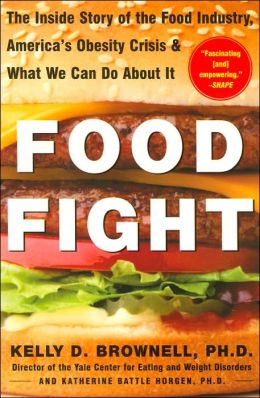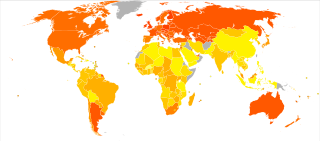The precautionary principle is a broad epistemological, philosophical and legal approach to innovations with potential for causing harm when extensive scientific knowledge on the matter is lacking. It emphasizes caution, pausing and review before leaping into new innovations that may prove disastrous. Critics argue that it is vague, self-cancelling, unscientific and an obstacle to progress.

"Junk food" is a term used to describe food that is high in calories from macronutrients such as sugar and fat, and often also high in sodium, making it hyperpalatable, and low in dietary fiber, protein, or micronutrients such as vitamins and minerals. It is also known as "high in fat, salt and sugar food". The term junk food is a pejorative dating back to the 1950s.

Fast food is a type of mass-produced food designed for commercial resale, with a strong priority placed on speed of service. Fast food is a commercial term, limited to food sold in a restaurant or store with frozen, preheated or precooked ingredients and served in packaging for take-out or takeaway. Fast food was created as a commercial strategy to accommodate large numbers of busy commuters, travelers and wage workers. In 2018, the fast-food industry was worth an estimated $570 billion globally.

Dick Taverne, Baron Taverne, is a British politician and life peer who served as Member of Parliament (MP) for Lincoln from 1962 to 1974. A member of the Liberal Democrats, he was a Labour MP until his deselection in 1972, following which he resigned his seat and won the subsequent by-election in 1973 as a Democratic Labour candidate.
Paul F. Campos is a law professor, author and blogger on the faculty of the University of Colorado Boulder in Boulder. Campos received his A.B. (1982) and M.A. in English (1983) from the University of Michigan and in 1989 his J.D. from the University of Michigan Law School. Campos worked at the law firm Latham & Watkins in Chicago from 1989-1990 and became an associate professor at the University of Colorado in 1990, where he teaches classes on property, punishment theory, jurisprudence and legal interpretation.

Michael F. Jacobson is an American scientist and nutrition advocate. He holds a Ph.D. in microbiology from Massachusetts Institute of Technology.
A fat tax is a tax or surcharge that is placed upon fattening food, beverages or on overweight individuals. It is considered an example of Pigovian taxation. A fat tax aims to discourage unhealthy diets and offset the economic costs of obesity.

Food Fight: The Inside Story of the Food Industry, America's Obesity Crisis, & What We Can Do About It, published on September 16, 2004, by McGraw-Hill, was written by Kelly D. Brownell, Director of the Rudd Center for Food Policy and Obesity at Yale.

Fast food advertising promotes fast food products and utilizes numerous aspects to reach out to the public.
A food environment is the "physical presence of food that affects a person's diet, a person's proximity to food store locations, the distribution of food stores, food service, and any physical entity by which food may be obtained, or a connected system that allows access to food".

Diet plays an important role in the genesis of obesity. Personal choices, food advertising, social customs and cultural influences, as well as food availability and pricing all play a role in determining what and how much an individual eats.

Obesity in the United Kingdom is a significant contemporary health concern, with authorities stating that it is one of the leading preventable causes of death. In February 2016, former Health Secretary Jeremy Hunt described rising rates of childhood obesity as a "national emergency". The National Childhood Measurement Programme, which measures obesity prevalence among school-age pupils in reception class and year 6, found obesity levels rocketed in both years groups by more than 4 percentage points between 2019–20 and 2020–21, the highest rise since the programme began. Among reception-aged children, those aged four and five, the rates of obesity rose from 9.9% in 2019–20 to 14.4% in 2020–21. By the time they are aged 10 or 11, more than a quarter are obese. In just 12 months, the rate is up from 21% in 2019–20 to 25.5% in 2020–21.
Sir Peter Julius Lachmann was a British immunologist, specialising in the study of the complement system. He was emeritus Sheila Joan Smith Professor of Immunology at the University of Cambridge, a fellow of Christ's College, Cambridge and honorary fellow of Trinity College, Cambridge and of Imperial College. He was knighted for service to medical science in 2002.
Based in Washington, D.C., Leadership for Healthy Communities is a $10-million national program of the Robert Wood Johnson Foundation designed to engage and support local and state government leaders nationwide in their efforts to advance public policies that support healthier communities and prevent childhood obesity. The program places an emphasis on policies with the greatest potential for increasing sustainable opportunities for physical activity and healthy eating among children at highest risk for obesity, including African-American, Latino, American Indian and Alaska Native, Asian-American and Pacific Islander children living in lower-income communities. The foundation's primary goal is the reversal of the childhood obesity epidemic by 2015.

According to 2007 statistics from the World Health Organization (WHO), Australia has the third-highest prevalence of overweight adults in the English-speaking world. Obesity in Australia is an "epidemic" with "increasing frequency." The Medical Journal of Australia found that obesity in Australia more than doubled in the two decades preceding 2003, and the unprecedented rise in obesity has been compared to the same health crisis in America. The rise in obesity has been attributed to poor eating habits in the country closely related to the availability of fast food since the 1970s, sedentary lifestyles and a decrease in the labour workforce.

Pacific island nations and associated states make up the top seven on a 2007 list of heaviest countries, and eight of the top ten. In all these cases, more than 70% of citizens aged 15 and over are obese. A mitigating argument is that the BMI measures used to appraise obesity in Caucasian bodies may need to be adjusted for appraising obesity in Polynesian bodies, which typically have larger bone and muscle mass than Caucasian bodies; however, this would not account for the drastically higher rates of cardiovascular disease and type 2 diabetes among these same islanders.

Obesity in the Middle East and North Africa is a notable health issue. Out of the 15 fattest nations in the world as of 2014, according to the World Health Organization (WHO), five were located in the Middle East and North Africa region.

Waistland: The R/evolutionary Science Behind Our Weight and Fitness Crisis is a book by Harvard psychologist Deirdre Barrett published by W. W. Norton & Company in 2007. The book examines the obesity and fitness crisis from an evolutionary standpoint. Barrett argues that our bodies, our metabolisms, and our feeding instincts evolved during humanity’s hunter-gatherer phase. We're programmed to forage for sugar and saturated fats because these were once found only in hard-to-come-by fruit and game. Now, these same foods are everywhere—in vending machines, fast food joint, restaurants, grocery stores, and school cafeterias—they're nearly impossible to avoid. She describes this as related to the focus of another of her books " supernormal stimuli"—the concept of artificial creations that appeal more to our instincts than the natural objects they mimic—supernormal stimuli for appetite have led to the obesity epidemic. The book opens with a vignette about how zoos post signs saying "Don't Feed the Animals." People respect these orders, allowing veterinarians to prescribe just the right balanced diet for the lions, koalas, and snakes. Meanwhile, everyone stops for chips, sodas, and hot dogs on the way out of the zoo. The book explores solutions from behavior modification to willpower to change diet and exercise habits. One of the main messages of the book is that big changes in diet are actually easier than small ones, that the addictive nature of junk food means that, after a few days, eating no cookies or chips is easier than eating fewer cookies or chips.

Blake Ferguson Donaldson was an American physician, hunter and early advocate of a meat-only diet, which later became known as the carnivore diet.
Vincent Marks was an English pathologist and clinical biochemist known for his works on studying insulin and hypoglycemia. His contributions to medical science include simplifying low blood glucose testing, introducing insulin radioimmunoassay, and advancing diabetes research. Marks played an important role in high-profile medico-legal cases, notably providing expert testimony that helped acquit Danish-born British socialite Claus von Bülow in 1985, a case that was the basis of the Oscar-winning movie Reversal of Fortune (1990).













